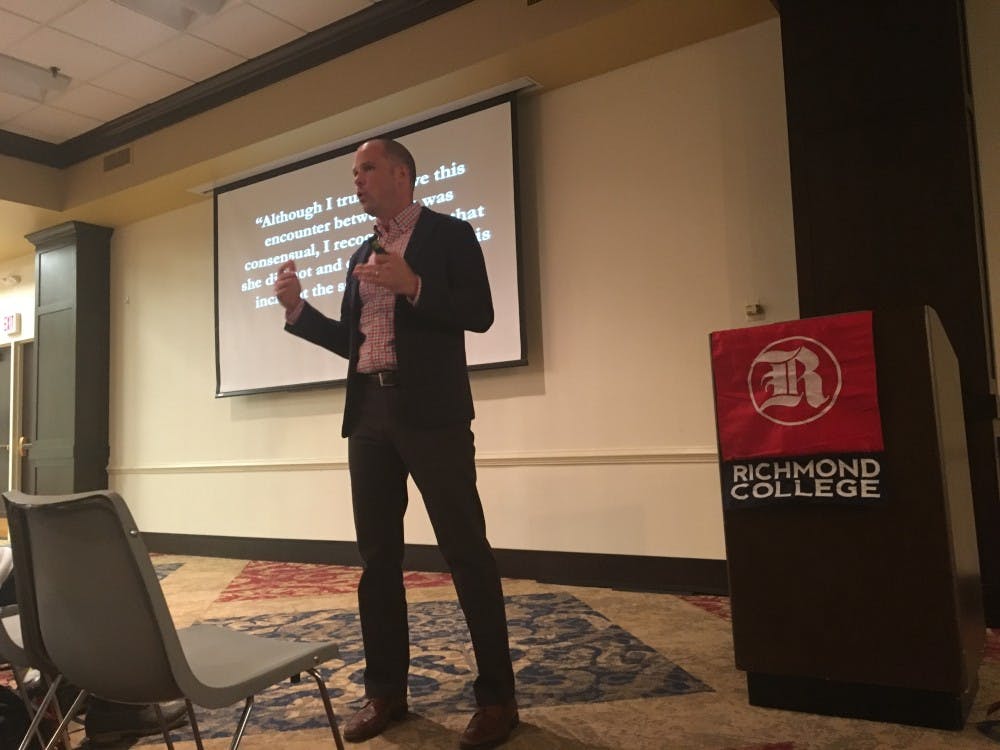Keith Edwards, a nationally recognized speaker on sexual assault and male identity, discussed how students can be proactive in his talk, “Ending Rape: Addressing the Roots of Sexual Violence,” on Tuesday evening.
The event was organized by Richmond College and was Edwards' second lecture of the day. His first focused on gender-identity development in college men.
Edwards, who used to work as a Title IX investigator, began by defining "sexual harassment" as words or gestures of a sexual nature that are not wanted, "sexual assault" as touching of a sexual nature that isn’t wanted and "rape" as penetration without consent. He concluded that “all rape is a form of sexual assault, but not all sexual assault is a form of rape.”
Edwards classified rape culture, which he defined as the culture that encourages, condones and teaches people to rape, as a primary cause of sexual assault. He focused on how students have been educated in a way that accepts it, an education rooted in the popular culture of movies, TV shows, song lyrics and posters.
“The rape culture is around us all the time,” Edwards said. “If you’ve never noticed the rape culture, it’s not because it’s not there, but because it is everywhere, and when it is everywhere we stop paying attention to it."
Edwards noted that 84 percent of men who admitted to committing actions of sexual violence didn’t believe that they had committed sexual assault, and that 84 percent of women who reported sexual violence knew their perpetrator. He said one in four college women reported attempted or actual sexual assault.
“We all want to believe that rapists are bad, terrible people,” Edwards said. “We want to believe that rapists are deviant people in our normal culture, but what we really see is that rapists are mostly normal people in a deviant culture and we are all a part of the responsibility and the accountability.”
Edwards also discussed how society knows that people rape, but the focus is always on the victim. He noted the many warnings tell women and girls to stay safe, from not walking home alone at night to not wearing provocative clothes. With all these warnings, it becomes harder to end rape because the focus is diverted away from the perpetrator, he said.
“When we as a society talk about who sexual violence happens to, but we don’t talk about who’s doing it, it absolves our ability to be part of the solution,” Edwards said. “If we don’t know who’s doing it then we can’t be part of the solution."
Edwards connected the rape problem on college campuses to the atmosphere that combines the hook-up scene with alcohol. Despite this, Edwards looked at the possibility of greater prevention at Richmond because of its smaller size.
Edwards said that everyone had the opportunity to help stop sexual violence on campus.
“We need to add to this reactive approach — which is so important — a proactive approach," he said.
Enjoy what you're reading?
Signup for our newsletter
Because there is no evidence that the amount of sexual violence has declined, people need to change how they view rape, Edwards said.
“Optimism requires evidence that things are getting better, but hope is a spiritual leap of faith that things are going to get better,” Edwards said. “When it comes to sexual violence, I cannot be optimistic because we’ve seen the evidence is not here. But I remain hopeful because of you.”
Contact reporter Stacey Dec at stacey.dec@richmond.edu
Support independent student media
You can make a tax-deductible donation by clicking the button below, which takes you to our secure PayPal account. The page is set up to receive contributions in whatever amount you designate. We look forward to using the money we raise to further our mission of providing honest and accurate information to students, faculty, staff, alumni and others in the general public.
Donate Now



